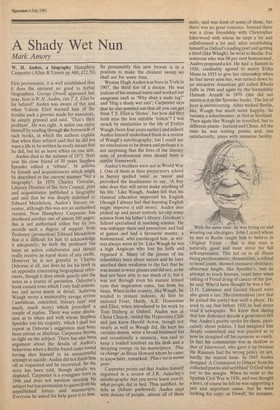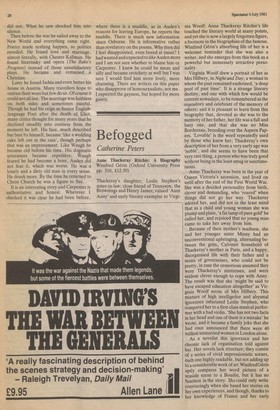A Shady Wet Nun
Mark Amory
W. H. Auden, a biography Humphrey Carpenter (Allen & Unwin pp.460, £12.50) First provenance; it is well established that it does the eminent no good to forbid biographies. George Orwell appeared last year, here is W.H. Auden, can T. S. Eliot be far behind? Auden was aware of this and when Valerie Eliot warned him of the trouble such a proviso made for executors, he simply grinned and said, 'That's their problem'. He was right. A sadist can enjoy himself by reading through the forewords of such books, in which the authors explain that when their subject said that he did not want a life to be written he really meant that he did; but let us leave ethics on one side.
Auden died in the autumn of 1973. Next year his close friend of 50 years Stephen Spender edited a 'tribute', 34 articles by friends and acquaintances which might be described in the current manner 'Not a biography'. In 1979 Charles Osborne, Literary Director of the Arts Council, poet and acquaintance published a biography and said that he was deeply indebted to Edward Mendelson, Auden's literary executor, although this was not an authorised version. Now Humphrey Carpenter has produced another one of almost 500 pages; this is not authorised either but he too records such a degree of support from Professor (promotion) Edward Mendelson that it is difficult for him to acknowledge it adequately; he feels the professor has been an active collaborator and should really receive an equal share of any credit. However he is not grateful to Charles Osborne at all, nor does he list his book in an appendix concerning biographical references, though it does sneak quietly into the notes as a source of quotation. Osborne's book caused rows which I only half remember and never .knew in detail. Auberon Waugh wrote a memorably savage review ('ambitious, conceited, literary runt' and much, much more) which provoked a couple of replies. There was some discussion as to when and with whom Stephen Spender lost his virginity, which I shall not repeat as Osborne's suggestion may have been untrue or libellous; Carpenter throws no light on the subject. There has also been argument about the details of Auden's behaviour when a Berlin friend came round having shot himself in an unsuccessful attempt at suicide; Auden did not finish him off as requested and he recovered. So the story has been told, though details are disputed. Carpenter is a youngster born in 1946 and does not mention meeting his subject but has permission to quote from his unpublished letters and manuscripts. Everyone he asked for help gave it to him. So presumably this new broom is in a position to make the cleanest sweep we shall see for some time.
Wystan Hugh Auden was born in York in 1907, the third son of a doctor. He was jealous of his unusual name and worked out anagrams such as 'Why shun a nude tag?' and 'Hug a shady wet nun'; Carpenter says that he also pointed out that all you can get from T.S. Eliot is 'litotes', but how did they both miss the less suitable 'toilets'? I was struck by similarities to the life of Evelyn Waugh (born four years earlier) and indeed Auden himself underlined them in a review of Waugh's autobiography; but I could see no conclusions to be drawn and perhaps it is not surprising that the lives of the literary sons of professional men should have a similar framework.
Auden's brothers were not in World War I. One of them at their preparatory school in Surrey spelled 'rnisit' as `missie and provoked the headmaster to say, 'A boy who does that will never make anything of his life.' Like Waugh, Auden felt that his classical education improved his English (though I always feel that learning English might improve it still more). Auden also picked up and never entirely let slip some science from his father's library. Gresham's School specialised in teaching science. He was unhappy there and precocious and bad at games and had a favourite master, a homosexual, who encouraged him, as writers always seem to be. Like Waugh he was a high Anglican who lost his faith and regained it. Many of the poems of his schooldays were about nature and he later ascribed their weakness to the fact that he was meant to wear glasses and did not, so he had not been able to see much of it; but it was not through even his mature lensed eyes that inspiration came, but from his brain. When in the country, like Waugh, he tended to remain indoors. At first he imitated Frost, Hardy, A.E. Houseman and Eliot, when introduced to his work by Tom Driberg at Oxford. Auden was at Christ Church, visited the Hypocrites Club and just knew Harold Acton, though not nearly as well as Waugh did. He kept his curtains drawn, wore a broad-brimmed hat and occasionally a monocle, was said to keep a loaded revolver on his desk and a decaying orange on his mantelpiece. 'Plus ca change' ,as Brian Howard whom he came to know later, remarked, 'Plus c'est la meme pose.'
Carpenter points out that Auden himself regretted in a review of J.R. Ackerley's autobiography that you never knew exactly what people did in bed. Thus justified, he tells us (fellatio preferred). Auden slept with dozens of people, almost all of them male, and was fond of some of them, but there was no great romance. Instead there was a close friendship with Christopher Isherwood with whom he slept a bit and collaborated a lot and, after establishing himself as Oxford's leading poet and getting a third (like Waugh), he went to Berlin. For someone who was 98 per cent homosexual, Auden proposed a lot. He had a fiancée in 1928, creditably agreed to marry Erika Mann in 1935 tá give her citizenship when he had never seen her, was turned down by an attractive American girl called Rhoda Jaffe in 1946 and again by the formidable Hannah Arendt in 1970 (she did not mention it in the Spender book). The list of boys is uninteresting. After wicked Berlin, like Waugh but much more happily, he became a schoolmaster, at first in Scotland. Then again like Waugh he travelled, but to different places—Iceland and China. All the time he was writing poems and, less satisfactorily, plays with immense facility. _ With the same ease, he was trying on and wearing out ideologies. John Layard whom he met in Berlin taught him to believe in Original Virtue — that is that man is naturally good and must strive for full self-expression. This led on to all illness being psychosomatic; rheumatism, a refusal to bend joints, showed excessive obstinacy; abnormal height, like Spender's, was an attempt to reach heaven; years later when talking of Freud dying of cancer of the jaw, he said 'Who'd have thought he was a liar.' D.H. Lawrence and Gerald Heard _were also given a run. His communism (not that he joined the party) was such a phase. He used to say that before 1930 he had never read a newspaper. We know that during that low dishonest decade a generation felt that Auden's poetry spoke for them, particularly about politics. I had imagined .him deeply committed and was puzzled as to how he sloughed off his opinions so easily. In fact his communism was as shallow as that of Isherwood, who gave it up because the Russians had the wrong policy on sex, hardly the central issue. In 1943 Auden dropped 'A Communist to Others' from his collected poems and scribbled '0 God what rot' in the margin. When he went to the Spanish Civil War in 1936, and was thought a hero, of course he felt he was supporting a just and important cause, but he went looking for copy, as Orwell, for instance, did not. What he saw shocked him into silence.
Then before the war he sailed away to the New World and everything came right. Poetry made nothing happen, so politics receded. He found love and marriage, almost literally, with Chester Kaltman. He found Stravinsky and opera (The Rake's Progress) instead of those unsatisfactory plays. He became and remained a Christian.
Later he found Ischia and even better his house in Austria. Many travellers hope to outrun their woes but few do so. Of course it could not all last. The marriage was faithless on both sides and sometimes painful. Though he had his reign as Senior Englishlanguage Poet after the death of Eliot, many critics thought for many years that he declined steadily into cosiness from the moment he left. His face, much described but best by himself, became 'like a wedding cake left out in the rain', though perhaps that was an improvement. Like Waugh he became old before his time. His dogmatic utterances became repetitive; Waugh feared he had become a bore, Auden did not fear it, which was worse. He was a lonely and a dirty old man in every sense. He drank more. By the time he returned to Christ Church he was a figure to flee.
It is an interesting story and Carpenter is authoritative and honest. Wherever I checked it was clear he had been before, where there is a muddle, as in Auden's reasons for leaving Europe, he reports the muddle. There is much new information since Osborne. He is informative rather than revelatory on the poems. Why then did I feel disappointed, even bored at times? I had wanted and expected to like Auden more and I am not sure whether to blame him or Carpenter. I knew he could be mean and silly and became crotchety as well but I was sure I would find him more lively, more charming. There are writers on this paper who disapprove of homosexualists; not me. I expected the gayness, but hoped for more gaiety.







































 Previous page
Previous page